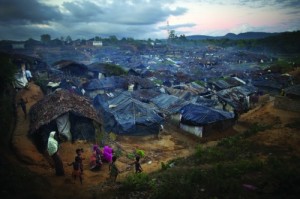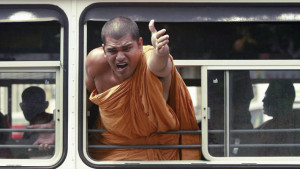Burma and Sri Lanka: Radical Strains of Buddhism
ASIA--PACIFIC, MILITARISM, RELIGION, 3 Jun 2013
Alex Caring-Lobel – Journalists for Democracy in Sri Lanka
Virulent anti-Muslim violence has once again enveloped a Burmese town—this time Lashio in the northeastern Shan State. What was once perceived as an isolated outbreak of murderous rioting in the western Rakhine state against Rohingya Muslims last year has now become a common occurrence in locales across the country, where not only Rohingya but all Muslims have become viable targets.
Reacting to a quarrel between a Buddhist woman and an older Muslim male customer, Buddhist mobs—with monks in their ranks—armed with rocks, sticks, and machetes took to setting fire to the city’s largest mosque, a Muslim school, Muslim orphanage, and scores of Muslim-owned shops.
NPR reported an account of Buddhist shop-owner Ma Sandar Soe, whose CD shop and recording studio, situated next to the mosque, were burnt to the ground along with it.
While recent outbreaks of Buddhist-led violence against Muslims have been associated with various disputes and rumors of violence, anti-Muslim—and for that matter, anti-Indian—racism has a long history stretching back to colonial times which is deeply enmeshed in Burmese culture and identity. (You can read more about that in my interview with Burmese dissident Maung Zarni, conducted just hours after the rioting in Meiktila, Burma.)
It is only recently, however, that state powers and radical ultranationalist strains of Buddhism have compounded to create what has been called “genocide” in the pages of Tricycle (Vol. XXII No. 3, spring 2013), many months before the conflict was deemed “ethnic cleansing” by Human Rights Watch. The term is still not widely used, however, as its deployment by any sovereign government or conglomeration of governments would require intervention. But most governments are not even willing to maintain trade sanctions in light of President Thein Sein’s economic and journalistic reforms, not to mention the opening up of the nation’s market, which has incited something of a feeding frenzy.
In that article Zarni uses the United Nations Convention on the Prevention and Punishment for the Crime of Genocide to make a case for using the term “genocide.” The convention defines genocide as the committing of any of five acts “with the intent to destroy, in whole or in part, a national, ethnical, racial, or religious group,” the fourth of which is “Imposing measures intended to prevent births within the group.” At the time the article was written, Zarni was most likely referring to laws requiring Muslim couples to receive government approval to marry—often through paying bribes. He might have also been referring to a two-child limit that was written into law back in 1994, but has largely gone unenforced. This changed just days ago when officials in Rakhine State chose to enact the law, a decision met with an outcry from human rights groups and even eliciting criticism from Aung San Suu Kyi, who has remained for the most part silent in regard to the plight of the Rohingya.
“It is discriminatory and also violates human rights,” the National League of Democracy leader told reporters on Monday.
The birth restriction makes Myanmar “perhaps the only country in the world to level such a restriction against a particular religious group,” reports Associated Press. Ironically, the country most famous for its child-limiting policy, China, actually exempts ethnic minorities.
The recent policy is but an addition to a number of other restrictions imposed on this same group of Rohingya in western Burma. The movement of displaced Rohingya, who are denied citizenship despite inhabiting the land for generations, is severely restricted by state security that prevents them from even going to school or visiting the hospital. Doctors Without Borders has reported several human rights concerns: “tuberculosis patients unable to access the treatment they need to stay alive, and pregnant women dying unnecessarily because they have nowhere safe to deliver.”
State security forces moved Rohingya into refugee-like camps in Rakhine State with the pretense of protecting them from anti-Muslim violence, but at this point it is unclear whether the camps’ fences and guards are there to keep attackers out or keep the Rohingya in.

Thousands of unregistered Rohingya Muslim refugees from Burma live next to the registered refugee camp at Kutupalong Refugee Camp, Bangladesh. Jonathan Saruk/Getty images.
Across the Bay of Bengal, a Therevada Sri Lankan monk—adopting what has become a common strategy among Tibetan Buddhist monks—self-immolated in the street. The monk, Ven. Indarathana, set himself on fire outside the Temple of the Tooth—the holiest Buddhist shrine in the country—in protest of the Muslim halal method of slaughtering animals.
Ven. Indarathana belonged to the Buddhist revivalist group Voice of Sinhala, a hardline Buddhist rights group. This could qualify the self-immolation as the first connected with an anti-Muslim organization. According to BBC correspondent Charles Haviland, Sinhalese ultranationalist government ministers are praising the incident as “an act of self-sacrifice for the good of the country.”
___________________________
Alex Caring-Lobel, works as the Editorial Assistant of the ‘Tricycle: The Buddhist Review magazine.’
DISCLAIMER: The statements, views and opinions expressed in pieces republished here are solely those of the authors and do not necessarily represent those of TMS. In accordance with title 17 U.S.C. section 107, this material is distributed without profit to those who have expressed a prior interest in receiving the included information for research and educational purposes. TMS has no affiliation whatsoever with the originator of this article nor is TMS endorsed or sponsored by the originator. “GO TO ORIGINAL” links are provided as a convenience to our readers and allow for verification of authenticity. However, as originating pages are often updated by their originating host sites, the versions posted may not match the versions our readers view when clicking the “GO TO ORIGINAL” links. This site contains copyrighted material the use of which has not always been specifically authorized by the copyright owner. We are making such material available in our efforts to advance understanding of environmental, political, human rights, economic, democracy, scientific, and social justice issues, etc. We believe this constitutes a ‘fair use’ of any such copyrighted material as provided for in section 107 of the US Copyright Law. In accordance with Title 17 U.S.C. Section 107, the material on this site is distributed without profit to those who have expressed a prior interest in receiving the included information for research and educational purposes. For more information go to: http://www.law.cornell.edu/uscode/17/107.shtml. If you wish to use copyrighted material from this site for purposes of your own that go beyond ‘fair use’, you must obtain permission from the copyright owner.
Read more
Click here to go to the current weekly digest or pick another article:
ASIA--PACIFIC:
- The Hawaiians Who Want Their Nation Back
- The Hidden Meaning of the Martial Law in South Korea
- The Machu Picchu Declaration of the Asia-Pacific Economic Cooperation-APEC 2024
MILITARISM:
- Think Tanks Fueling Endless War - Think Tanks or Stink Tanks?
- Dolphins in the Military
- US Has Given Israel $22 Billion in Military Aid since October 2023
RELIGION:
